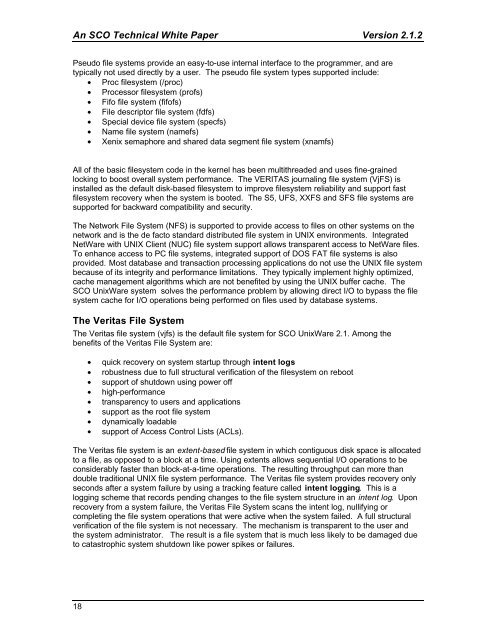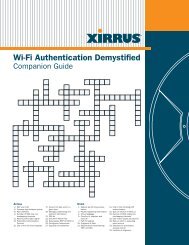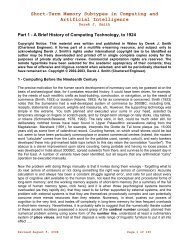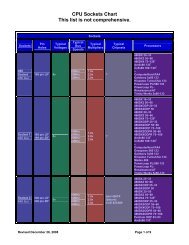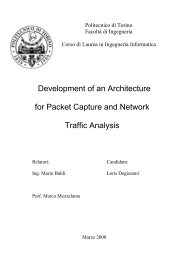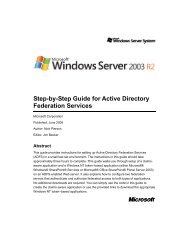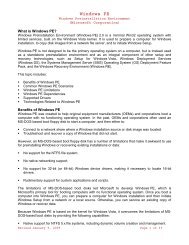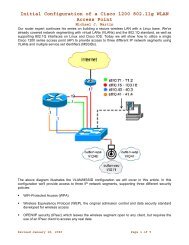SCO UnixWare 2.1 Technical Summary - Bandwidthco Computer ...
SCO UnixWare 2.1 Technical Summary - Bandwidthco Computer ...
SCO UnixWare 2.1 Technical Summary - Bandwidthco Computer ...
You also want an ePaper? Increase the reach of your titles
YUMPU automatically turns print PDFs into web optimized ePapers that Google loves.
An <strong>SCO</strong> <strong>Technical</strong> White Paper Version <strong>2.1</strong>.2<br />
Pseudo file systems provide an easy-to-use internal interface to the programmer, and are<br />
typically not used directly by a user. The pseudo file system types supported include:<br />
• Proc filesystem (/proc)<br />
• Processor filesystem (profs)<br />
• Fifo file system (fifofs)<br />
• File descriptor file system (fdfs)<br />
• Special device file system (specfs)<br />
• Name file system (namefs)<br />
• Xenix semaphore and shared data segment file system (xnamfs)<br />
All of the basic filesystem code in the kernel has been multithreaded and uses fine-grained<br />
locking to boost overall system performance. The VERITAS journaling file system (VjFS) is<br />
installed as the default disk-based filesystem to improve filesystem reliability and support fast<br />
filesystem recovery when the system is booted. The S5, UFS, XXFS and SFS file systems are<br />
supported for backward compatibility and security.<br />
The Network File System (NFS) is supported to provide access to files on other systems on the<br />
network and is the de facto standard distributed file system in UNIX environments. Integrated<br />
NetWare with UNIX Client (NUC) file system support allows transparent access to NetWare files.<br />
To enhance access to PC file systems, integrated support of DOS FAT file systems is also<br />
provided. Most database and transaction processing applications do not use the UNIX file system<br />
because of its integrity and performance limitations. They typically implement highly optimized,<br />
cache management algorithms which are not benefited by using the UNIX buffer cache. The<br />
<strong>SCO</strong> <strong>UnixWare</strong> system solves the performance problem by allowing direct I/O to bypass the file<br />
system cache for I/O operations being performed on files used by database systems.<br />
The Veritas File System<br />
The Veritas file system (vjfs) is the default file system for <strong>SCO</strong> <strong>UnixWare</strong> <strong>2.1</strong>. Among the<br />
benefits of the Veritas File System are:<br />
18<br />
• quick recovery on system startup through intent logs<br />
• robustness due to full structural verification of the filesystem on reboot<br />
• support of shutdown using power off<br />
• high-performance<br />
• transparency to users and applications<br />
• support as the root file system<br />
• dynamically loadable<br />
• support of Access Control Lists (ACLs).<br />
The Veritas file system is an extent-based file system in which contiguous disk space is allocated<br />
to a file, as opposed to a block at a time. Using extents allows sequential I/O operations to be<br />
considerably faster than block-at-a-time operations. The resulting throughput can more than<br />
double traditional UNIX file system performance. The Veritas file system provides recovery only<br />
seconds after a system failure by using a tracking feature called intent logging. This is a<br />
logging scheme that records pending changes to the file system structure in an intent log. Upon<br />
recovery from a system failure, the Veritas File System scans the intent log, nullifying or<br />
completing the file system operations that were active when the system failed. A full structural<br />
verification of the file system is not necessary. The mechanism is transparent to the user and<br />
the system administrator. The result is a file system that is much less likely to be damaged due<br />
to catastrophic system shutdown like power spikes or failures.


